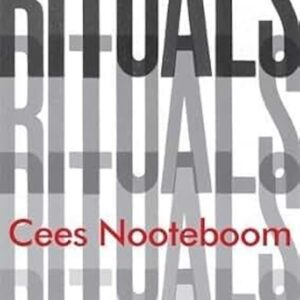One of the most evident features of my novel Absolute Music, which Slant publishes this July, is the large number of references to authors of literary and philosophical works, a number of composers, and, despite my ignorance of visual art, to two painters. These references are sometimes explicit, even quotation, and sometimes they are no more than oblique allusions. Some references, such as to the work of J. S. Bach, Bob Dylan, Franz Rosenzweig, or Edmund Spenser, provide the visible structure of the novel. But the author I’ll now treat (partly by imitating) goes without reference of any kind.
In the summer of 2016, I matriculated into an MFA program. My initial work in the program was epistolary, a series of sprawling letters written from discrete places (Beaver Island, Michigan, for example, or the American cemetery at Margraten in the Netherlands) by the fictional person who would eventually become the narrator of Absolute Music. These pieces, however, failed to cohere as a novel, and I had no intention of writing anything but a novel for the MFA.
By the end of the following summer I was at the beginning of what in that program we called the essay semester, which is meant to produce a lengthy and profound reflection on a single work. This essay was not an academic study of the kind I had abandoned some years previously but rather one writer’s reflection from the point of view of craft (or what David Jones called artefaction) on the work of another writer. But the subject of my essay had so far eluded me, because I had become convinced of certain ideas which I wanted to discover in fiction but had not so far discovered there.
The fiction I wanted to write had for its imagined audience a single ideal reader. I was aware that language directed to the grammatical second person necessarily must be spoken or written in the first person: every you logically implies an I and every (sane) I implies a you. Furthermore, I was convinced that all storytelling, though it might be written in the third person, had at its heart a first-person consciousness, the consciousness of a narrator, and all true fiction therefore addressed a you.
I must report one more idea which had taken hold of me and which seemed to put me at odds with prevailing notions, namely that true fiction was no kind of pretense of actuality, and certainly not a speculation about potentiality, but rather a report about something which must be at least as actual or real as the person writing the words of this blog post.
These ideas were inchoate and abstract. The fiction I was reading at the time, including that of Karen Blixen, Karl Ove Knausgaard, Annie Ernaux, Rachel Cusk, and Teju Cole, seemed to confirm my ideas, but none of those authors had chosen to make a work of fiction from such raw materials, so to speak, though they all seemed to have come very close to doing so.
What seemed to be missing from the work of the authors just mentioned, as well as from that of others I was reading, like Thomas Bernhard, Tomas Espedal, and W. G. Sebald, was a sense of place that did not feel arbitrary, like a setting (however painstakingly painted or perceived) for the fiction. And yet, for the purposes of my essay I was also not interested in writers who found symbolic value in certain landscapes and made them into characters more memorable, perhaps, than the human persons who filled their fiction: writers I had admired such as Annie Dillard, John Cowper Powys, Lawrence Durrell, Cormac McCarthy, D. H. Lawrence, Gustaf Sobin, Charles-Ferdinand Ramuz, Jean Giono, and Bruce Chatwin. A plainly allegorical landscape, as in the fantasies of David Landsay and Hope Mirrlees, did not fit the bill either.
And then my wife casually mentioned a review essay by Ben Lerner of a new edition of a novel called The Plains, first published in 1982 (the year of my birth) by an Australian author I had never heard of, Gerald Murnane. I cannot recall anything Lerner wrote about Murnane’s book, but the result of my reading the review was my purchase of The Plains. Within a month of reading that book, I had written my degree essay. Nine days after submitting the essay, on Friday the 20th of October 2017, I wrote the first sentences of the first draft of Absolute Music. Friday the 20th of October 2017 is also the date on which the narrator of Absolute Music begins his story.
What had I found in the work of Gerald Murnane that I had not been able to find elsewhere and which had proved so fruitful for me? The fullest answer I can provide to that question is on offer in Absolute Music, where Gerald Murnane, and the country where he lives and which forms the landscape of his mind—which is to say, his fiction and, on his view, some province of cosmic consciousness itself—are never mentioned. But a shorter answer, which I hope will intrigue you about both my novel and Murnane’s body of work, bears for me a kind of strange hope.
By exploring the consciousness of a narrator—which, as I say, is depicted as a landscape and its human families, a consciousness which he calls the invisible world or the mind, not limited to the individual perspective of an octogenarian Australian—Murnane discovers that reality is much larger than the one described by the disenchanted materialism of contemporary culture. This reality admits of many interconnected and at times and in places confused levels or degrees (such as the somewhat unruly hierarchy, so to speak, of author-narrator-reader), and it is governed by a providence that appears as mere coincidence. The furthest limits of this greater reality lie on the far side of what we call fiction and are thus not finally conformable to language.
From our point of view, we are actual and the worlds of fiction are potential or the pretense of actuality. But Murnane promises that from the point of view of further, more real provinces of reality, it is we who are potential. If I could make one recommendation to the reader it would be to consider that this discovery is no different than what it would once have meant, in the language of a now exsanguinated theological idiom, to truly feel and understand that in relation to God we are nothing and our eons, seemingly eternal, are but day and night. Some assert this thought is degrading, but to encounter it through Murnane’s fiction—its countless fallings in love, its endless grassy plains—you would rather think it an enchantment of memory and desire.
In this life we may enter the world of fiction but may not surpass its further frontier. Beyond lies what Murnane at other times calls not (his) mind, but heaven. As he puts it in his recent book (the last, he says, of his lifetime), the country on the far side of fiction, which he hopes to see only upon his death, is “true knowledge, endless plains, and eternal magic.”
Jonathan Geltner lives in Ann Arbor, Michigan with his wife and two sons. His translation of Paul Claudel’s Five Great Odes is available from Angelico Press and a novel, Absolute Music, is forthcoming from Slant. If you enjoy his posts at Close Reading, check out his new Substack, Romance and Apocalypse, for more frequent and in-depth essays on the places where literature and other arts meet religious ideas and experience.





